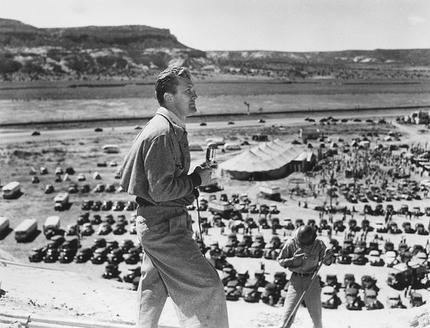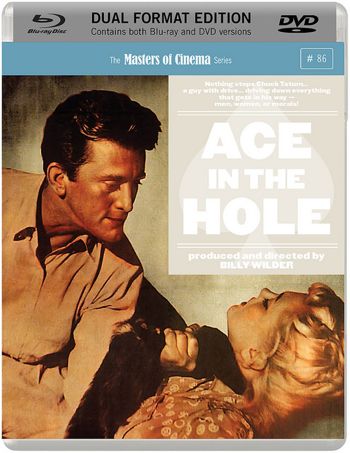Learning From The Masters Of Cinema: Billy Wilder's ACE IN THE HOLE

Released in 1951, Ace in the Hole marked a pivotal moment in the career of its writer-director, Billy Wilder, for a number of different reasons. His scathing attack on the media was Wilder's first film after breaking his long-term writing partnership with Charles Brackett, which over 12 years had garnered two Best Screenplay Oscars (for The Lost Weekend and Sunset Blvd.), three more Oscar nominations and a string of commercial hits. Ace in the Hole also marked Wilder's first credit as producer as well as writer and director. More importantly, it also proved to be his first flop, breaking a string of box office successes dating back to 1939's Ninotchka. However, in the ensuing decades the film has been the subject of much re-assessment and is now widely considered one of Wilder's greatest artistic successes.
In a role that would help establish him as one of the great screen actors of the 1950s, Kirk Douglas plays wily East Coast newsman Chuck Tatum, who arrives in the relatively sleepy town of Albuquerque, New Mexico looking for a job. Proudly announcing to Jacob Boot, editor of the Albuquerque Sun-Bulletin that he's been fired from 11 different publications for everything from heavy drinking to sleeping with his boss' wife, he is nevertheless hired and before long has hit upon a hot lead.
Tatum stumbles across the story of Leo Minosa, who has been trapped in a cave-in while searching for indian artefacts. Seizing the opportunity, Tatum heads into the cave to find Minosa for himself, and begins cooking up a headline-grabbing story of a sensational rescue effort, against the backdrop of a mystical curse. Brokering deals with the sheriff and a local drilling contractor, Tatum engineers a situation where he has sole access to Leo during the needlessly lengthy rescue, and as he whips public interest into a frenzy through his exclusive copy, Tatum aims to cash-in big-time and regain his former position in New York.
While such a cynical portrayal of the media might seem rather cliched and old hat in this day and age, in 1951 Wilder was arguably ahead of his time, painting Tatum as a predatory opportunist penning human interest stories for hard cash, while his sole interest is actually in his own professional advancement. In order to make the scenario more accessible, Wilder packages Ace in the Hole as a more familiar and digestible film noir, with Tatum as a ruthless, down-at-heel grifter, and Jan Sterling as the femme fatale fly in the ointment of his grand plan.

It transpires that while the world is in love with the half-buried Leo, his wife Lorraine knows him better, and pounces on the chance to escape her wife-beating husband. It is up to Tatum to convince Lorraine she needs to stay in town and play her part as the grieving wife if his story is to unfold as planned. The media circus he creates will bring plenty of business and hard cash to her restaurant-cum-trading post, but Tatum knows his story will need a happy ending - in the form of their reconciliation upon Leo's rescue. What we the audience know only too well from Wilder's set-up however, is that these stories never end well, and Tatum is doomed almost from the outset.
The tone of Ace in the Hole is unrelentingly bleak, portraying the press as soulless predators, who will do whatever it takes to get the story they want, regardless of the ramifications for those it affects. Today we pretty much accept that all reportage must be taken with a grain of salt, that the exploitation of the subject matter is part of the game and that the pre-existing agendas of the individual journalists - and to an even larger degree the news outlets they represent - is way more important than the absolute truth. When the film was about to be released, this proved all too much for Paramount Pictures. The studio panicked at the eleventh hour, and in a bizarre effort to repackage the film, changed its title (without informing Wilder) to The Big Carnival, but to no avail. The public balked and the film bombed.
The critical reception to the film was actually mixed, with some outlets including Variety actually praising the film right from the off, while The New York Times called it "something of a dramatic grotesque...weakened by a poorly constructed plot...not only naive but absurd". The Hollywood Reporter took equally personal offence to the film, labelling it "a brazen uncalled-for slap in the face of...democratic government and free press," but it is little wonder that journalists would take personally to such an unprecedented attack on their profession. Sixty years later, Wilder's claims seem far from preposterous, naive or absurd, to the point that the drama at the centre of the film is just as impactful to modern day audiences, if not more so.
Ace in the Hole benefits from Wilder's acerbic, whip-smart dialogue, penned this time in collaboration with Lesser Samuels and Walter Newman, and based (though unacknowledged at the time) on a pitch by Victor Nesny, about the noted cave explorer William Floyd Collins. The film also features a knockout central performance from Kirk Douglas, who somehow manages to make Chuck Tatum charismatic, despite all his selfish manipulation, backstabbing, lying and self-aggrandising. He knows, under all his showboating and sleight of hand, he's really a worthless rat, yet is also an incredible salesman, which almost proves enough. Jan Sterling more than holds her own as the icy Lorraine, eager to manipulate Chuck and anyone else in order to escape, and there's strong support from the likes of Porter Hall and Robert Arthur too.
Masters of Cinema's new dual format Blu-ray/DVD release of the film boasts a stunning 1080p transfer of what many have claimed to be one of Wilder's best-looking films. In terms of supplemental material, the disc includes an illuminating interview with film scholar and Wilder expert Neil Sinyard about the making of the film, as well as the fantastic French documentary Portait of a "60% Perfect Man": Billy Wilder, which features a series of interviews with the Austrian-born director covering his entire filmmaking career. The package also features the film's original theatrical trailer and a 32-page booklet featuring a new essay on Wilder from Emmanuel Burdeau. All round, Masters of Cinema has delivered a predictably fine quality release of one of Wilder's perhaps lesser-known efforts, which should not only facilitate the ongoing re-evaluation of Ace in the Hole, but help elevate its to standing to appear alongside The Apartment, Sunset Blvd., Double Indemnity and Some Like It Hot as one of Billy Wilder's greatest films.
Ace in the Hole is available on dual format Blu-ray/DVD from The Masters Of Cinema series now.

Do you feel this content is inappropriate or infringes upon your rights? Click here to report it, or see our DMCA policy.






